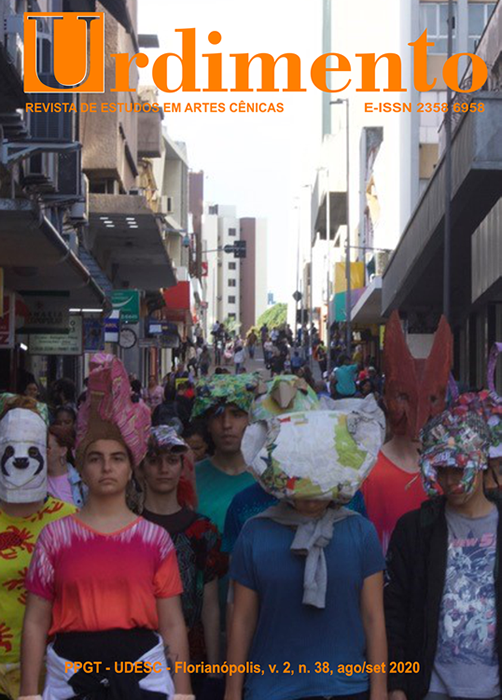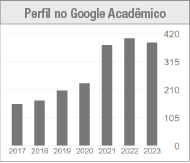Restless spatialities: SobreVivo, trajectories of a blackened creation
DOI:
https://doi.org/10.5965/14145731023820200008Keywords:
Theater, Anti-racism, Blackness, Festivity, SpatialitiesAbstract
The paper reflects on the creative process of SobreVivo - Antes que o baile acabe, focusing on the dynamics of the spatial composition of the performance, considering its aesthetic, ethical, poetic, political and social aspects. The play addresses ethnical-racial themes through an anti-racist approach that seeks to build a blackened space, supported by black people cultural manifestations, such as funk, slam, samba and African-based religiosity, as well as African-centered notions, such as escrevivência and quilombism. The dramaturgy was devised by the group through biographical narratives evoking their experiences in terms of blackness and racism. The scene conceived is both critical and festive, questioning the social positions of the viewers.
Downloads
References
ALCÂNTARA, Celina Nunes de. Fala negra: um trabalho vocal para teatro como ato político. Repertório, Salvador, ano 21, n. 30, p. 281-295, 2018.1
BARRETO, Raquel. Uma pensadora brasileira. Revista Cult, 3 julho 2019. Disponível em: https://revistacult.uol.com.br/home/lelia-gonzalez-perfil/. Acesso em: 5 ago. 2029.
CARNEIRO, Sueli. Enegrecer o feminismo: a situação da mulher negra na América Latina a partir de uma perspectiva de gênero. Em HOLLANDA, Heloisa Buarque. Pensamento Feminista. Conceitos Fundamentais. Rio de Janeiro: Bazar do Tempo, 2019.
ESTRELA D’ALVA, Roberta. Um microfone na mão e uma idéia na cabeça – o poetry slam entra em cena. Synergies Brésil. n. 9, p. 119-126, 2011.
ESTRELA D’ALVA, Roberta. Teatro Hip-Hop. São Paulo: Perspectiva, 2015.
EVARISTO, Conceição. Conceição Evaristo: Minha escrita é contaminada pela condição de mulher negra. Nexo Jornal, [S. l.], p. 1, 26 maio 2017. Disponível em: https://www.nexojornal.com.br/entrevista/2017/05/26/Concei%C3%A7%C3%A3o-Evaristo-%E2%80%98minha-escrita-%C3%A9-contaminada-pela-condi%C3%A7%C3%A3o-de-mulher-negra%E2%80%99.
Acesso em: 29 maio 2020.
EVARISTO, Conceição. Escrevivências da afro-brasilidade: história e memória. Releitura, Belo Horizonte, n. 23, 2008. Disponível em: <http://nossaescrevivencia.blogspot.com/2012/08/escrevivencias-da-afro-brasilidade.html> Acesso em: 12 jul. 2019.
FAGUNDES, Patrícia. La Ética de la Festividad en la Creación Escénica . 2010. 567 p. Tese (Doutorado)- Facultad de Humanidades Comunicación y Documentación, Universidad Carlos III, Madrid, Espanha, 2010. Disponível em: https://e-archivo.uc3m.es/handle/10016/7557. Acesso em: 24 maio 2018.
LIMA, Eugênio. A missão em fragmentos: doze cenas de descolonização em legítima defesa. São Paulo: N-1 edições, 2017.
NASCIMENTO, Abdias do. O genocídio do negro brasileiro: processo de um racismo mascarado. Rio de Janeiro: Paz e Terra, 1978.
NASCIMENTO, Abdias do. O quilombismo: Documentos para uma militância pan-africanista. 1. ed. Petrópolis: Vozes, 1980. v. 1.
RIBEIRO, Djamila. O que é Lugar de Fala?. Belo Horizonte: Letramento, 2017.
PIRAJIRA, Thiago. A resistência do povo negro? Carnaval consciente, Carnaval guerreiro. Gaúcha ZH, Porto Alegre, 12 fev. 2018. Disponível em: https://gauchazh.clicrbs.com.br/opiniao/noticia/2018/02/thiago-pirajira-a-resistencia-do-povo-negro-carnaval-consciente-carnaval-guerreiro-cjdkfe7nd00zf01rva1fd55x4.html. Acesso em: 13 mar. 2019.
ROSA, Sandino Rafael da Silva. SobreVivo: Trajetórias de uma encenação enegrecida. Orientador: Patrícia Fagundes. 2019. Memorial crítico reflexivo (Mestrado em Artes Cênicas) - PPGAC/UFRGS, Porto Alegre, 2019. Disponível em: https://lume.ufrgs.br/handle/10183/204935. Acesso em: 18 jun. 2020.
SOUZA, Neusa Santos. Tornar-se negro: As vicissitudes da Identidade do Negro Brasileiro em ascensão social. Rio de Janeiro: Graal, 1983.
Downloads
Published
How to Cite
Issue
Section
License
Copyright (c) 2020 Urdimento - Revista de Estudos em Artes Cênicas

This work is licensed under a Creative Commons Attribution 4.0 International License.
Copyright Statement
The articles published by the magazine are free to use. The copyright is all assigned to the magazine. The articles whose authors are identified represent the expression from the point of view of their authors and not the official position of the journal Urdimento. The author (s) undertakes whenever publishing material relating to the article published in Revista Urdimento mention the said publication as follows: This article was originally published by Urdimento magazine in its volume (put the volume), number (put the number) in the year of (put the year) and can be accessed at:
http://www.revistas.udesc.br/index.php/urdimento
This work is licensed under a Creative Commons Attribution 4.0 International License.




